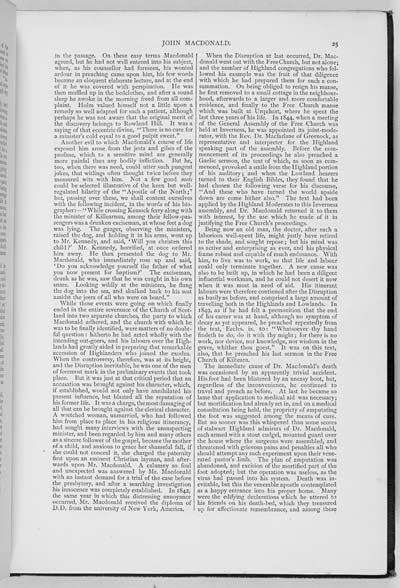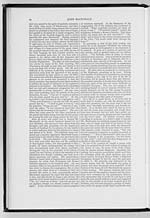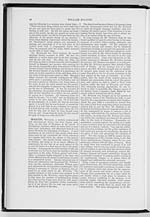25
in the passage. On these easy terms Macdonald
agreed, but he had not well entered into his subject,
when, as his counsellor had foreseen, his wonted
ardour in preaching came upon him, his few words
became an eloquent elaborate lecture, and at the end
of it he was covered with perspiration. He was
then muffled up in the bedclothes, and after a sound
sleep he awoke in the morning freed from all com-
plaint. Holm valued himself not a little upon a
remedy so well adapted for such a patient, although
perhaps he was not aware that the original merit of
the discovery belongs to Rowland Hill. It was a
saying of that eccentric divine, "There is no cure for
a minister's cold equal to a good pulpit sweat."
Another evil to which Macdon aid's course of life
exposed him arose from the jests and gibes of the
profane, which to a sensitive mind are generally
more painful than any bodily infliction. But he,
too, when there was need, could utter such pungent
jokes, that witlings often thought twice before they
measured wits with him. Not a few good mots
could be selected illustrative of the keen but well-
regulated hilarity of the "Apostle of the North;"
but, passing over these, we shall content ourselves
with the following incident, in the words of his bio-
grapher:�"While crossing Kessock ferry along with
the minister of Killearnan, among their fellow-pas-
sengers was a drunken exciseman, at whose feet a dog
was lying. The ganger, observing the ministers,
raised the dog, and holding it in his arms, went up
to Mr. Kennedy, and said, 'Will you christen this
child?' Mr. Kennedy, horrified, at once ordered
him away. He then presented the dog to Mr.
Macdonald, who immediately rose up and said,
'Do you acknowledge yourself the father of what
you now present for baptism?' The exciseman,
drunk as he was, saw that he was caught in his own
snare. Looking wildly at the ministers, he flung
the dog into the sea, and skulked back to his seat
amidst the jeers of all who were on board."
While those events were going on which finally
ended in the entire severance of the Church of Scot-
land into two separate churches, the party to which
Macdonald adhered, and the church with which he
was to be finally identified, were matters of no doubt-
ful question : hitherto he had acted wholly with the
intending out-goers, and his labours over the High-
lands had greatly aided in preparing that remarkable
accession of Highlanders who joined the exodus.
When the controversy, therefore, was at its height,
and the Disruption inevitable, he was one of the men
of foremost mark in the preliminary events that took
place. But it was just at that critical period that an
accusation was brought against his character, which,
if established, would not only have annihilated his
present influence, but blasted all the reputation of
his former life. It was a charge, the most damaging of
all that can be brought against the clerical character.
A wretched woman, unmarried, who had followed
him from place to place in his religious itinerancy,
had sought many interviews with the unsuspecting
minister, and been regarded by him and many others
as a sincere follower of the gospel, became the mother
of a child, and anxious to grace her shameful fall, if
she could not conceal it, she charged the paternity
first upon an eminent Christian layman, and after-
wards upon Mr. Macdonald. A calumny so foul
and unexpected was answered by Mr. Macdonald
with an instant demand for a trial of the case before
the presbytery, and after a searching investigation
his innocence was completely established. In 1842,
the same year in which this distressing annoyance
occurred, Mr. Macdonald received the diploma of
D.D. from the university of New York, America.
When the Disruption at last occurred, Dr. Mac-
donald went out with the Free Church, but not alone;
and the number of Highland congregations who fol-
lowed his example was the fruit of that diligence
with which he had prepared them for such a con-
summation. On being obliged to resign his manse,
he first removed to a small cottage in the neighbour-
hood, afterwards to a larger and more comfortable
residence, and finally to the Free Church manse
which was built at Urquhart, where he spent the
last three years of his life. In 1844, when a meeting
of the General Assembly of the Free Church was
held at Inverness, he was appointed its joint-mode-
rator, with the Rev. Dr. Macfarlane of Greenock, as
representative and interpreter for the Highland
speaking part of the assembly. Before the com-
mencement of its proceedings he also preached a
Gaelic sermon, the text of which, as soon as com-
menced, provoked a smile from the Highland portion
of his auditory; and when the Lowland hearers
turned to their English Bibles, they found that he
had chosen the following verse for his discourse,
"And these who have turned the world upside
down are come hither also." The text had been
applied by the Highland Moderates to this Inverness
assembly, and Dr. Macdonald returned it to them
with interest, by the use which he made of it in
justifying the Free Church's proceedings.
Being now an old man, the doctor, after such a
laborious well-spent life, might justly have retired
to the shade, and sought repose; but his mind was
as active and enterprising as ever, and his physical
frame robust and capable of much endurance. With
him, to live was to work, so that life and labour
could only terminate together. A new cause was
also to be built up, in which he had been a diligent
influential workman, and he could not desert it now
when it was most in need of aid. His itinerant
labours were therefore continued after the Disruption
as busily as before, and comprised a large amount of
travelling both in the Highlands and Lowlands. In
1849, as if he had felt a premonition that the end
of his career was at hand, although no symptom of
decay as yet appeared, he preached repeatedly from
the text, Eccles. ix. 10: "Whatsoever thy hand
findeth to do, do it with thy might; for there is no
work, nor device, nor knowledge, nor wisdom in the
grave, whither thou goest." It was on this text,
also, that he preached his last sermon in the Free
Church of Kiltearn.
The immediate cause of Dr. Macdonald's death
was occasioned by an apparently trivial accident.
His foot had been blistered by an uneasy boot, but,
regardless of the inconvenience, he continued to
travel and preach as before. At last he became so
lame that application to medical aid was necessary;
but mortification had already set in, and on a medical
consultation being held, the propriety of amputating
the foot was suggested among the means of cure.
But no sooner was this whispered than some scores
of stalwart Highland admirers of Dr. Macdonald,
each armed with a stout cudgel, mounted guard over
the house where the surgeons were assembled, and
threatened with grievous pains and penalties all who
should attempt any such experiment upon their vene-
rated pastor's limb. The plan of amputation was
abandoned, and excision of the mortified part of the
foot adopted; but the operation was useless, as the
virus had passed into his system. Death was in-
evitable, but this the venerable apostle contemplated
as a happy entrance into his proper home. Many
were the edifying declarations which he uttered to
his friends on his death-bed, which they treasured
up for affectionate remembrance, and among these

![]() Universal Viewer |
Universal Viewer | ![]() Mirador |
Large image | Transcription
Mirador |
Large image | Transcription
![]()

